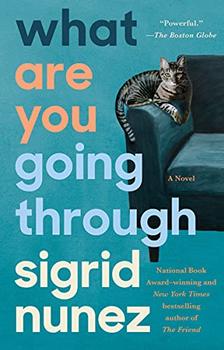Summary | Excerpt | Reading Guide | Reviews | Beyond the Book | Readalikes | Genres & Themes | Author Bio

Excerpt
What Are You Going Through
I went to hear a man give a talk. The event was held on a college campus. The man was a professor, but he taught at a different school, in another part of the country. He was a well-known author, who, earlier that year, had won an international prize. But although the event was free and open to the public, the auditorium was only half full. I myself would not have been in the audience, I would not even have been in that town, had it not been for a coincidence. A friend of mine was being treated in a local hospital that specializes in treating her particular type of cancer. I had come to visit this friend, this very dear old friend whom I had not seen in several years, and whom, given the gravity of her illness, I might not see again.
It was the third week of September, 2017. I had booked a room through Airbnb. The host was a retired librarian, a widow. From her profile I knew that she was also the mother of four, the grandmother of six, and that her hobbies included cooking and going to the theater. She lived on the top floor of a small condo about two miles from the hospital. The apartment was clean and tidy and smelled faintly of cumin. The guest room was decorated in the way that most people appear to have agreed will make a person feel at home: plush area rugs, a bed with a hedge of pillows and a plump down duvet, a small table holding a ceramic pitcher of dried flowers, and, on the nightstand, a stack of paperback mysteries. The kind of place where I never do feel at home. What most people call cozy-gemŸtlich, hygge-others find stifling.
A cat had been promised, but I saw no sign of one. Only later, when it was time for me to leave, would I learn that, between my booking and my stay, the host's cat had died. She delivered this news brusquely, immediately changing the subject so that I couldn't ask her about it-which I was in fact going to do only because something in her manner made me think that she wanted to be asked about it. And it occurred to me that maybe it wasn't emotion that had made her change the subject like that but rather worry that I might later complain. Depressing host talked too much about dead cat. The sort of comment you saw on the site all the time.
In the kitchen, as I drank the coffee and ate from the tray of snacks the host had prepared for me (while she, in the way recommended for Airbnb hosts, made herself scarce), I studied the corkboard where she posted publicity for guests about goings-on in town. An exhibition of Japanese prints, an arts-and-crafts fair, a visiting Canadian dance company, a jazz festival, a Caribbean culture festival, a schedule for the local sports arena, a spoken-word reading. And, that night, at seven thirty, the author's talk.
In the photograph, he looks harsh-no, "harsh" is too harsh. Call it stern. That look that comes to many older white men at a certain age: stark-white hair, beaky nose, thin lips, piercing gaze. Like raptors. Hardly inviting. Hardly an image to say, Please, do come hear me speak. Would love to see you there! More like, Make no mistake, I know a lot more than you do. You should listen to me. Maybe then you'll know what's what.
A woman introduces him. The head of the department that has invited him to speak. She is a familiar type: the glam academic, the intellectual vamp. Someone at pains for it to be known that, although smart and well educated, although a feminist and a woman in a position of power, the lady is no frump, no boring nerd, no sexless harridan. And so what if she's past a certain age. The cling of the skirt, the height of the heels, the scarlet mouth and tinted hair (I once heard a salon colorist say, I believe it's got to hurt a woman's ability to think if she has gray hair), everything says: I'm still fuckable. A slimness that almost certainly means going much of each day feeling hungry. It crosses such women's minds with some sad regularity that in France intellectuals can be sex symbols. Even if the symbol can sometimes be embarrassing (Bernard-Henri LŽvy and his unbuttoned shirts). These women have memories of being tormented in girlhood, not for their looks but for their brains. "Men don't make passes at girls who wear glasses" really meant smart girls, bookish girls, mathletes, and science geeks. Times change. Now who doesn't love eyewear. Now how common is it to hear a man boast about his attraction to smart women. Or, as one young actor recently shared: I've always felt that the sexiest women are the ones with the biggest brains. At which I confess I rolled my eyes so hard that I had to toss my head to get them to come down again.
Excerpted from What Are You Going Through by Sigrid Nunez. Copyright © 2020 by Sigrid Nunez. All rights reserved. No part of this excerpt may be reproduced or reprinted without permission in writing from the publisher.
Never doubt that a small group of thoughtful, committed people can change the world...
Click Here to find out who said this, as well as discovering other famous literary quotes!
Your guide toexceptional books
BookBrowse seeks out and recommends the best in contemporary fiction and nonfiction—books that not only engage and entertain but also deepen our understanding of ourselves and the world around us.